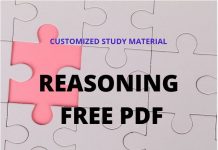Directions (1 to 10): Read the following passage carefully and answer the questions given below it.
Once a thief named Kalu had planned to loot the king’s treasury. At midnight, he went to the palace and began to drill a hole in the side wall of the treasury. The king, who was awake in his bedroom just above the treasury, came out to investigate the whirring sound. He was dressed in a simple nightgown and the thief could not recognize him. He asked Kalu who he was and what he was doing. The latter said, “Sir, I am a thief and intend to loot this treasury. I presume that you are also a thief and have come with the same intention. No matter, let us both go inside and we shall share the loot equally. “Both entered the treasury and divided all the money and the jewels equally between them. Inside a locker they found three big diamond pieces. As the thief was puzzled as to how to divide the three pieces into two portions, the king suggested. “We have taken away everything else. Let us leave one diamond piece for the poor king and share the rest equally”. Kalu agreed and when he took his leave, the king asked for his name and address. As Kalu had taken a vow of telling only the truth, he have the correct information. The king took away his share of the loot and hid it in his room. Next morning he asked his Prime Minister to inspect the treasury as he had heard some strange sounds during the previous night. The Prime Minister saw to his horror that all the valuables were missing and only a single diamond was left, perhaps inadvertently, by the thief. He put the diamond in his own shift pocket as its loss could be ascribed to the thief and nobody would suspect the Prime Minister. The Prime Minister went back to the king. The king particularly enquired. “Do you mean that the thief has completely denuded the treasury of its valuables and not a single item has been left?” The Prime Minister confirmed it. The king asked the chief of police to bring in Kalu. When Kalu came he was unable to recognize the king as his accomplice of the previous night. The king asked him, “Are you the thief who has stolen everything from my treasury leaving nothing back?” Kalu confirmed it but said, “Sir, I did leave one diamond back in the locker as advised by an accomplice of mine and it should still be there.” The Prime Minister interrupted saying, “Your Majesty, this thief is lying. There is nothing left in the locker.” The king asked the police chief to search the pockets of the Prime Minister, from where the missing diamond was recovered. The kind told his courtiers, “Here is a Prime Minister, who is a liar and a thief and here is a thief who is at truthful gentleman.”
1. The king came out in the middle of the night in order to
a) Help kalu to break into the palace treasury b) Share the loot equally between Kalu and himself
c) Find out the source of and reason for the sound he had heard
d) Catch the thief who had come to steal his valuables
e) None of these
2. Kalu could not recognize the king because
a) The king was wearing clothes like those of an ordinary person
b) The king’s clothes were covered by a simple night down
c) Kalu had never seen the king before
d) Kalu had not seen the king descending from his bedroom
e) None of these
3. Which of the following made the king suspect the Prime Minister? The Prime Minister’s statement that
a) Except for one piece of diamond all other valuables were stolen
b) All the valuables without any exception were stolen from the treasury
c) The thief was lying when he said he had left one diamond back in the Locker.
d) The search for the diamond did not yield any favorable result
e) None of these
4. Which of the following horrified the Prime Minister?
a) The valuables missing from the king’s treasury
b) A piece of diamond left in the locker
c) Certain strange sounds heard by the Prime Minister
d) The fact that the king suspected him of stealth
e) None of these
Choose the word which is most nearly the same in meaning as the word given in bold as used in the passage.
5. Accomplice
a) Co-traveler
b) Collaborator
c) Controller
d) Coordinator
e) Commuter
6. Ascribed
a) Attributed
b) Donated
c) Attached
d) Withdrew
e) Connected
7. Denuded
a) Uncovered
b) Stripped
c) Destroyed
d) Discarded
e) Abandoned
Choose the word which is most opposite in meaning of the word given in bold as used in the passage.
8. Inadvertently
a) Knowingly
b) Sensibly
c) Indifferently
d) Unwittingly
e) Unscrupulously
9. Previous
a) New
b) Preceding
c) Novel
d) Modern
e) Subsequent
10. Presume
a) Assume
b) Suppose
c) Infer
d) Doubt
e) Imagine
Directions (11 to 15): Read each sentence to find out whether there is any error in it. The error, if any, will be in one part of the sentence, the number of that part is the answer. If there is no error, the answer is (5).
11. In the field of invention (1) / the credit goes to a man (2) / who convinces the world (3) / with his arguments not to the man who simply thinks (4) / No Error (5).
12. When you will find (1) / out a solution (2) / to this problem, (3) / you will be awarded a prize. (4) / No Error (5).
13. Pakistan’s problems (1) / are also as (2) / serious as (3) / that of India. (4) / No Error (5).
14. Every teacher (1) / and every student (2) / of this school is determined to do their best (3) / for the benefit of all. (4) / No Error (5).
15. Taking breakfast (1) / he went to the office (2) / and ordered the staff (3) / to complete the work without any further delay. (4) / No Error (5).
Solution











